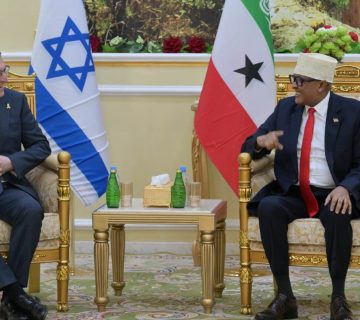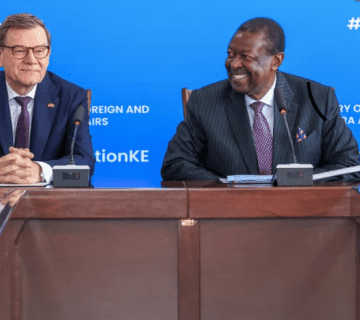South Sudan is now on a new path following the formation of the Revitalised Transitional Government of Nation Unity (R-TGoNU) on February 22, 2020. President Salva Kiir Mayardit swore in his long-time nemesis, Mr. Riek Machar Teny, as his first vice president – as envisaged in the Revitalised Agreement on the Resolution of Conflict in South Sudan (R-ARCSS) signed in September 2018. Along with Dr. Machar, three other vice presidents – Taban Deng Gai, James Wani Igaa, and Rebecca Nyandeng De Mabior were sworn in on that day. On February 25, Hussein Abdelbagi Ayii Akol was sworn in, becoming the fifth vice president. The formation of the R-TGoNU is a major milestone in the implementation of the R-ARCSS which is aimed at ending the six-year civil war. Although fighting reduced significantly after the signing of the R-ARCSS, progress in implementing the peace deal has been marked by deep mistrust and lack of political will among the main parties.
The formation of the R-TGoNU was side-tracked twice – in May and November 2019 – thanks to disagreements over the number and boundary of states; and security arrangements, mainly the unification of forces into state military. Since the start of the 100-day extension period, there was mounting pressure from the international community on President Kiir and Machar to resolve the outstanding issues that had stalled the formation of the ‘revitalized’ unity government. The last attempt in this regard came in during the 33rd Summit of the Africa Union, where leaders led by AU’s current chairperson, President Cyril Ramaphosa of South Africa, convened a series of consultative meetings with the two leaders in an effort to break the deadlock. While the better part of the new 100-day extended period passed without significant progress in resolving crucial matters, major concessions were made during the last week. For instance, President Kiir agreed to the 10-state configuration, but with three administrative areas of Abyei, Greater Pibor, and Ruweng. Machar also accepted to move back to Juba under the protection of President Kiir’s security.
Key Priorities
Despite this momentous step, critical challenges exist which, if not properly addressed, might create new fissures and trigger violence. First, fresh tensions over the loss of government jobs following the dissolution of the pre-transitional government might create a new crop of disgruntled leaders who may polarise the country further. Second, the unresolved issues including the fate of the newly created oil-rich administrative areas and pending resolutions on security arrangements might incite new fighting should the parties fail to quickly address them.
Given the hurried nature with which the R-ARCSS partners formed the R-TGoNU, in part, due to pressure from regional and international actors, the R-TGoNU might hit a potential deadlock or dysfunction if these parties mishandle the delicate relationship. This is what happened in July 2016 when the 2015 Agreement on the Resolution of Conflict in South Sudan (ARCSS) collapsed due to the skewed political power-sharing arrangement that triggered renewed violence between the government and opposition forces.
Against this backdrop, the transitional unity government should consider the following measures as crucial priorities in its bid to cement peace and stability in the war-ravaged country. First, the parties need to fast-track the implementation of the security arrangements including the cantonment and unification of forces into a national army. Although efforts to train and deploy an 83,000-strong military had kicked off early this year, this exercise is yet to be concluded. Besides, some security sector reforms provided for in the R-ARCSS such as division of units and VIP protection are yet to be rolled out. Further, as has been reported by Allan Boswell, a senior researcher at Crisis Group, both parties are still keeping their main forces in reserves awaiting deployment should a disagreement occur. As such failure to effectively and successfully implement the security arrangements could provide ground for renewed violence.
Second, there is a need to bring to the table other key stakeholders to the conflict who did not sign the R-ARCSS to enhance inclusivity and manage potential spoilers. According to Armed Conflict Location and Event Data (ACLED) there have been more than 45 armed groups engaged in fighting in South Sudan since the civil conflict broke out, some of whom have rejected the R-ARCSS, on grounds that it fails to address the root causes of the governance crisis at the heart of the conflict. For instance, former General Thomas Cirilo Swaka leader of National Salvation Front (NAS) and ex-army chief, Paul Malong, among others, have been leading rebel groups against government forces since mid-2017. Their inclusion in the newly formed unity government will consolidate political power within the new coalition arrangement and allow the government to embark on service delivery.
Third, the R-TGoNU should move with speed to address underlying human rights and humanitarian crisis in South Sudan. Since 2013, the civil conflict has caused extreme political, economic and social challenges which have exacerbated human suffering in the world’s youngest nation. About 400,000 people, mostly civilians, are estimated to have died in the conflict with over four million others being either internally displaced or driven out of the country, according to Human Rights Watch.
Cumulatively, the conflict in South Sudan has caused the greatest humanitarian crisis in the region, and by far the worst on the continent since the 1994 Rwandan genocide. A recent report by the United Nations Commission of Human Rights in South Sudan details how innocent civilians are being ‘deliberately starved, systematically surveyed and silenced’ by government and opposition forces mainly in Western Bahr El Ghazal and Unity states and elsewhere across the country. These fighting groups wage war on civilians as their primary target and commit grave violations to fundamental human rights including the disregard of sexual and gender rights, use of child soldiers and hindering civilian access to humanitarian aid including food as well as denial of fundamental freedom through arbitrary arrests and other criminal injustices.
As preconditions for sustainable peace and security, the revitalized unity government should put in place quick strategic measures that will ensure speedy but fair redress to all human rights violations and contain the humanitarian situation in the country. The revitalized unity government should also prioritize the inclusion of other rebel groups that are non-signatory to the R-ARCSS and fast-track the implementation of security arrangements. These, and other measures, will induce long term reconciliation, justice and healing, as well as state reconstruction.
Otieno O. Joel is a Research Assistant at the HORN Institute
Photo: A section of South Sudan citizens celebrating new-found independence in 2011. (Photo Credit: API)



